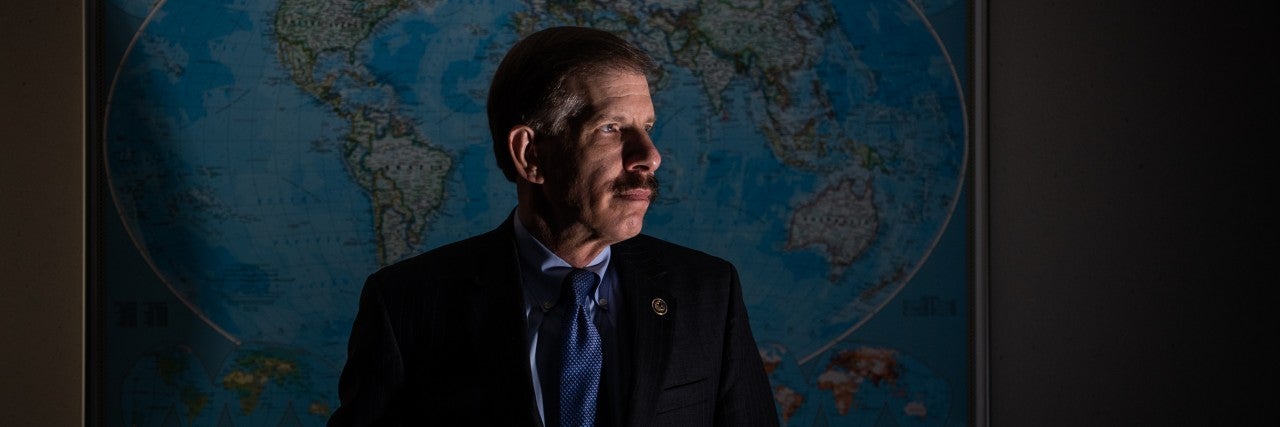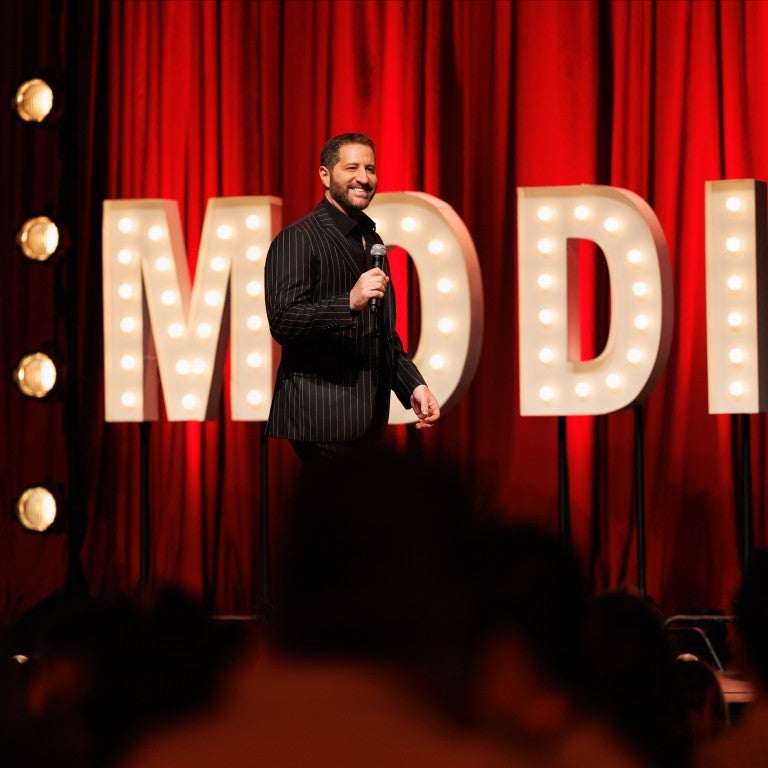March 11, 2021
This week, we’re in conversation with Eli Rosenbaum, Director of Human Rights Enforcement Strategy and Policy at the Department of Justice. For 40 years, Rosenbaum has helped the department track down former Nazis and hold them accountable for their World War II crimes, a role that has earned him the moniker of “Nazi Hunter”.
Then, Shira Loewenberg, Director of AJC's Asia Pacific Institute (API) speaks about the wide-scale democracy protests across Myanmar in the weeks since the local military’s February 1 coup d'état.
Listen to this episode on Apple Podcasts, Spotify, and Google Podcasts.
Episode Lineup:
- (00:40) Eli Rosenbaum
- (19:45) Shira Loewenberg
- (22:37) Manya Brachear Pashman
- (25:31) Seffi Kogen
Episode Transcript
Manya Brachear Pashman (0:28)
Newly appointed Attorney General Merrick Garland has said he will renew the Justice Department's focus on the threat of white supremacists. Eli Rosenbaum knows a thing or two about that ideology. For 40 years, he has helped the department track down and hold former Nazis accountable for their World War II crimes, a law enforcement role that has earned him the moniker of Nazi Hunter. Mr. Rosenbaum is with us now to talk about that moniker and that mission. Mr. Rosenbaum, welcome to People of the Pod.
Eli Rosenbaum (1:07)
Thank you. Great to be with you.
Manya Brachear Pashman (1:09)
So yes, you have been called the Nazi Hunter. I've seen the show on Amazon Prime. But what does that term mean in real life?
Eli Rosenbaum (1:17)
Well, it's not an expression I'm particularly fond of because it suggests that this mission is something other than what it is, which is professional law enforcement. We are not engaged in hunts or anything of the sort. But we have been for four decades now aggressively investigating, and taking legal action against participants in Nazi-era crimes against humanity.
Manya Brachear Pashman (1:45)
Your father escaped Nazi Germany in 1938, I believe. Can you share a little bit about how your family history inspired this work?
Eli Rosenbaum (1:53)
You know, my dad got out of Germany, lived in Dresden, with his brother and his parents. And they managed to get visas to this great country and were able to escape in 1938. As the Attorney General Merrick Garland said in his recent testimony, I think all the time about how the United States saved my family. My father graduated high school in Newark, New Jersey, and then started paying back United States by going into the United States Army. And he was sent to North Africa and to Europe, and served in the third Infantry Division. And then when they realized that they actually needed German speakers, they transferred him to a psychological warfare branch unit in the US seventh army. The incident that changed my father's life and had a big impact on me, I'm sure, was when he was sent to the Dachau concentration camp by his commanding officer, to go there in a Jeep with two other men, to see what the army had found the previous day when they liberated Dachau. Word spread quickly in the region that something terrible was there and my dad's CO wanted to know what it was, so my father went. When I was 14 years old, and we were driving on the New York State Thruway in a blizzard, heading north, and there was nothing left to listen to on the radio, we were talking. And I loved hearing my dad's war stories, especially the funny ones, anybody who serves in the military has some funny stories, be it about the food or whatever. And then suddenly he said, "You know, I was sent to Dachau, the day after its liberation." And I though 14, and that was a time when there wasn't much said really about the Holocaust, I knew what it was. And I said, "What did you see?" And I'm, like my father staring out the front window, because it's pretty treacherous driving. And I don't hear anything from my father. And I look over to the driver's seat and there I see dad with his eyes glistening. They're welled with tears and his mouth is open, and he's trying to tell me, and he couldn't speak. And that was the first time I ever saw my father cry. Men of that generation didn't want anyone to see them cry, usually. And we never did speak about it. So my beloved father lived, you know, into this new century, and so many, many decades. And we did speak about my work with frequency when I was home, but we never returned to the subject of Dachau.
Manya Brachear Pashman (4:17)
You say you talked about your work with your father. How did that conversation or the job evolve over the course of 40 years?
Eli Rosenbaum (4:24)
Sure, the work has changed quite a bit when I started, actually, as a summer intern back in 1979, never imagining that this would become my life's work. We were overwhelmed with investigations. We had inherited the responsibility from the former Immigration and Naturalization Service, after the Attorney General took it away from them because they had not succeeded. And he set up this new office, the Office of Special Investigations in the Justice Department Criminal Division, and we had more work than we could really keep up with. And it turned out in the first few years that the allegations we had inherited that actually had the most merit were ones that were based on tips received directly or indirectly from foreign governments, which at that time was to say mostly the Soviet Union, occasionally another government, but generally the Soviet Union, which had mixed motives in these cases. We started being very proactive within a few years. And by the five year point and thereafter, nearly all of the cases that we could develop to the point of prosecution were ones that we had initiated on our own. And the methodology for that was to task our staff historians. We were the only law enforcement entity in the entire hemisphere that had its own complement of historians. They were the people who could dig for the needles in haystacks. And we tasked them with responsibility for keeping an eye open for the surviving remnant of Nazi personnel records and other documents that identified perpetrators or potential perpetrators. This they did with great success. And ultimately, we assembled more than 70,000 names of suspects, mostly European, also some Japanese. And we ran each of those names, one by one, against U.S. immigration records, and sometimes other records in an effort to see if we could determine whether any of those people came here, assuming they hadn't changed their names. And that was pretty complicated, actually, because of the fact that Cyrillic names, for instance, can be transliterated in many ways. But we ran those names, and we got a surprising number of matches. And then the investigation began in earnest. And we ultimately brought over 130 cases. And there was a time when we would have 20 cases in court or more at the same time. Today, of course, it's very different. There isn't as much proactive work to be done. We've mined most of the information that we could find, and very few of the perpetrators are still alive. That scenario, I suppose, is exemplified by the case that was recently in the news that we won this past month. Ultimately, a case of Friedrich Karl Berger of Oak Ridge, Tennessee, who was a concentration camp guard during World War II, and we proved in court that he guarded prisoners in a sub-camp of the Neuengamme concentration camp, who were worked under very inhumane conditions. Many, many perished. We proved that he took part on the death march from this sub-camp in Meppen, Germany or near Meppen, Germany, back to the main camp of Neuengamme. But that may well be our last Nazi case. We'll see we have some investigative activities still underway.
Manya Brachear Pashman (7:53)
Now I want to point out that you said your department pursued prosecution of 130 cases. You successfully prosecuted 109. That's more than all other countries combined. Can you tell us a little bit more about the Berger case and how after all this time you found him?
Eli Rosenbaum (8:11)
I think what I can say right now is that this was the result of a partnership with Ludwigsburg. I don't think I can go into further detail at this time. But it's in the public record that the original lead on Mr. Berger was the examination of information that was found in 1950 when a series of more than 2,000 personnel cards, German personnel cards, wartime personnel cards, which turned out to be personnel cards for Neuengamme concentration camps system guards, were salvaged from a cargo ship that had been tragically bombed by the British Royal Air Force just before wars end on May 3, 1945, along with another ship. But five years after this particular ship, the Thielbek, German police salvaged it and found these cards and copied down information that was on them and over 1500 guards could be identified. It turned out that of the more than 1500, perhaps only two were alive. One of them being in the United States. Mr. Berger.
Manya Brachear Pashman (9:19)
When you finally tracked these suspects down, do they express remorse for what they did?
Eli Rosenbaum (9:24)
Great question. I've been waiting for over 40 years to hear an expression of remorse from one of our suspects or defendants. Usually what you hear is denial. "It's not me. I wasn't there. Me? A guard at a death camp? Never." Or they say, "I had no choice, wasn't my idea to persecute these people. But I was assigned to do it and I did it." And when you ask them, "well, it was bad?" And they say yes. And we say "Well, did you ask for a transfer to another assignment, to say, a regular military assignment?" They always say no, or that they didn't think they would get a transfer, though transfers were easily obtainable as we have proved in our case time after time. But I have thought about what I would say if one of these people were to express remorse. I've questioned quite a few of them myself. And I decided that if anyone ever said that, I would say, well, it's very good to hear that. But you are expressing your apologies to the wrong person. You need to apologize to your victims. And unfortunately, few, if any of them, are alive.
Manya Brachear Pashman (10:30)
Was that difficult to hear, that absence of remorse, especially given your personal connection and the emotional impact it had on your father?
Eli Rosenbaum (10:38)
I don't think it's affected my work in questioning suspects. That's a unique undertaking when you prepare as much as you can, and then you are focused like a laser beam on what the other person is saying and trying to lead them to the truth as best you can. And you have to be not only proactive, but very reactive to what they're saying. The substance of what they're saying, if they do make admissions, usually doesn't hit you until hours later when you come down from that experience.
Manya Brachear Pashman (11:09)
Did being Jewish make a difference?
Eli Rosenbaum (11:11)
I've not spoken about this before. I will say that it did affect how I felt I was perceived in this work. I don't know a better way to put that. I can't begin to tell you, Manya, how many interviews I've given over the years in which journalists haven't had the nerve to ask me, "Are you Jewish?" which they usually can surmise if they haven't, you know, actually established it from my name, you know, but they'll say, "Well, you know, do you have any special reasons to be interested in these cases? Do you have any family connection to these cases??
Manya Brachear Pashman (11:47)
Why were you so sensitive?
Eli Rosenbaum (11:48)
I thought people would assume that I was not acting fairly and professionally in this work, that somehow I was applying some standard other than those that we customarily employ in the Department of Justice, that we probably employ. I feel strongly that we've adhered to those standards and that I've done whatever I can to make sure that people who worked under me on these cases understood that that was the policy. I've been known to say at staff meetings that when I was the head of OSI that I want everyone to remember that we represent the people. And in a way that includes our suspects and our defendants. We work for them too. We're trying to get the truth and we will prosecute them if the facts and the law are there. We need to respect their rights and we need to do everything by the book.
Manya Brachear Pashman (12:38)
Have you delivered the news to survivors that the man or woman, you prosecuted both right? The man or woman that victimized them or their family members has been caught?
Eli Rosenbaum (12:48)
Yes, I and colleagues have had the experience of reaching out to survivors and delivering the news. And I can think of any number of instances in which that happened. For me most movingly, it wasn't the survivor herself, because she had passed away, but it was her daughter. And I had believed by the time that happened, which was years after we successfully prosecuted the case, that no one from that family had survived. And it was a great joy to learn that one person had survived and made her way to South America. And then finally to speak with her daughter, and to be able also to share with the family, the documents we had found about the fate of the family in Europe. They were very sad documents involving, among others, a six-year-old girl by the name of Fruma Kaplan, whom I had spoken of in many, many speeches over the years, that she had no burial place. She was buried in a pit with thousands, 50,000, or several pits with 50,000 other Jews in Paneriai, outside of Vilnius, Lithuania. And then to find out one member of that family had survived and to speak with, if memory serves, ultimately, the great niece of this six-year-old girl who was shot to death was beyond moving.
Manya Brachear Pashman (14:11)
I bet.
Eli Rosenbaum (14:11)
And in response to your question about women, one of the more interesting cases we brought was against a San Francisco resident by the name of Elfriede Rinkel. And another attorney and I made an unannounced visit to our home, something that we did with some frequency. I did the first one back in 1982 when I persuaded my boss that we should comport ourselves the way other law enforcement agencies do. We should go interview suspects, not send them letters all the time inviting them to come and see us. And I want to point out that contrary to the popular image of Nazis being elderly, decrepit men, back then our subjects were on average much younger. And the first person I interviewed was all of 61, was still working, which is to say he was younger then than I am now. The woman in San Francisco had been a guard at the notorious Ravensbrück concentration camp, and I will always remember when we walked in, when she agreed to let us in, and explained in some detail what we wanted to discuss, she walked out of the room and came back with a small photograph that she wanted us to see. And I kind of thought I knew what that was going to be because I had googled her name and I'd seen the obituary of her husband, who was Jewish, and a refugee from Nazi Europe. And so what she brought out was a photograph of his tombstone. She said nothing. She just handed it to us. It was a very large tombstone in a Jewish cemetery, a big star of David, Magen David, at the top, and on the left side, his name and his birth and death years, and it said husband of Elfriede. And on the right side, clearly, space left for her name and particulars to be engraved. And we asked her about her wartime experiences, and she admitted to some of what she had done. And I eventually asked her if she had ever told her husband, and she said, Yes, but later, after she was deported, she gave a news interview and gave an answer that I thought more likely, which is no, she never told.
Manya Brachear Pashman (16:17)
You talked to your father about your work. Did you talk to your daughters?
Eli Rosenbaum (16:22)
I waited a while before I spoke to my girls about what daddy was doing for a living. I did used to worry that, you know, having all the books that I use in my work around the house might have a problematic impact. And I used to imagine one of my kids, not knowing what this is all about, would go to school and draw a swastika, you know, and I get a call from the principal. Fortunately, that didn't happen.
Manya Brachear Pashman (16:45)
You mentioned that Mr. Berger may be the last Nazi, though there are still some active investigations. What does that mean for the future of your division at the Justice Department?
Eli Rosenbaum (16:54)
Our office, now called the Human Rights and Special Prosecution section, you're in the Justice Department Criminal Division in Washington, is still active in the Nazi cases, as we demonstrated this past couple of weeks in the Berger case. But also in a much bigger way, because of the realities in cases of post-World War II human rights violators who've managed to find safe haven in the United States, and the government is determined to end that safe haven. And we have successfully prosecuted people who have committed crimes in places like Bosnia, in Guatemala, and Liberia, and on and on. A tragically long list of countries in which crimes against humanity and genocide and other crimes have been committed. So we are hard at work on those cases, trying to apply the lessons we've learned in pursuing Nazi cases.
Manya Brachear Pashman (17:48)
Lessons learned. You mentioned lessons learned. And you mentioned Merrick Garland, who was confirmed this week. What lessons have been learned in this 40 year pursuit of Nazi-era criminals that can be applied to what he says will be the department's focus on domestic terrorism? I mean, many of these terrorists share the same ideology as your suspects. What can be applied to curb the threat on our soil?
Eli Rosenbaum (18:11)
We've certainly learned the lesson that is a lesson that is not a new one. And the nice way of saying is that the pen is mightier than the sword, the perhaps not so nice way is saying that words can be very dangerous in the hands of people with malign intent. I well recall that we brought a number of cases against Nazi propagandists who came to the United States, who in the old country had helped create a climate of opinion in which Nazi depredations against Jews and gypsies and others were, if not accepted by larger populations, or at least there was little attempt to intervene and to bring those crimes to an end. We certainly have to do a better job of teaching tolerance and teaching kindness, so the principal obligation is on our parents and teachers. I will tell you, the hardest thing I've ever had to do in my job was to go and teach one day, three elementary school classes on the subject of tolerance. Tolerance does not come naturally to children. And it was also the most satisfying thing I've probably ever done in my career.
Manya Brachear Pashman (19:20)
Mr. Rosenbaum, thank you so much for joining us.
Eli Rosenbaum (19:23)
Thank you, Manya. It's been great to be with you.
Seffi Kogen (19:31)
Now it's time for our closing segment Shabbat Table Talk. And joining us at our Shabbat table this week is Shira Loewenberg, the director of AJC's Asia Pacific Institute. Shira, when you're talking with your family at your Shabbat table this weekend, what are you going to be talking about?
Shira Loewenberg (19:45)
It's good to be with you. Thank you. This week, what I'll be talking about at my Shabbat table is the conversation I had just yesterday with Sammy Samuels, who's the head of Yangon's Jewish community in Myanmar. Sammy joined AJC for an exclusive Advocacy Anywhere Insiders Briefing to share his direct experience and observations from Yangon, where he lives, of the ongoing protests throughout Myanmar in opposition to a military coup that occurred on February 1 of this year. On February 1, the leader of the National League for Democracy Aung San Suu Kyi and Myanmar's President Win Myint were arrested, and the military took control of the government. Since that date, there have been some 2,000 others that have been detained including NLD officials, journalists, and civilians, and more than 50 deaths reported. Protests are not new to the people of Myanmar, who lived under military rule for more than 30 years beginning in 1962. The people of Myanmar have seen some change since 2008, when the military ceded some power to a civilian led government. And there had been very high hopes inside the country and in the West for Myanmar being on the road to full democracy.
I led an AJC delegation to Myanmar in December of 2016. And I can tell you that the mood in the country at that time and in the international community was extremely hopeful. Those hopes were dashed with last month's military coup. Now there's a lot of Burmese history to what brings us to the present day. But for the Shabbat table, the point that I'll make is that we must do more than hope for better days ahead. We must act. AJC and the Jacob Blaustein Institute had been calling upon the U.S. government and the international community to impose targeted sanctions against Burmese military leaders in response to a previous crisis, the credible reports of a genocide perpetrated by the military against the Rohingya minority in 2017. Today, we must continue these efforts to rally the United States and the international community to condemn the Myanmar military regime for its actions against its people and impose damaging sanctions. We must join the brave people of Myanmar who are marching and striking and speaking out, putting their lives on the line, and call for the restoration of democracy. As the numbers of arbitrary arrests increase, as the death toll rises, as reports of repression continue, the military junta must not be permitted to act with impunity. As we approach Passover and reflect upon our journey from slavery and oppression to freedom, my hope is that the people of Myanmar, too, have a similar path to freedom in the days ahead.
Manya Brachear Pashman (22:37)
Shira, thank you for keeping us attuned to what's happening abroad. At our Shabbat table, we will be talking about the faraway land of Texas, where shops and restaurants have removed the signs from their doors mandating masks. The plexiglass shields guarding customers and clerks from each other's germs have been dismantled. I have been fuming this past week about the removal of the mask mandate there. It's been over a year since my children have seen their grandmother, aunt, uncle and cousin. Over two years since they've seen the blue bonnets that bloomed early when my father died. His yahrzeit is Tuesday. This inevitably prolongs our separation, though with any luck, my family soon will be vaccinated and able to travel our direction, wearing masks. That's unlikely to happen in time for Passover, when so many other families are preparing to break their fast from each other. Which brings me to the Kosher Palate, a popular kosher market in Dallas. Upon learning of the reprieve, the shop's owners immediately informed their customers they could leave their masks at home. With a Passover holiday starting at the end of this month, observant and non-observant customers flocked to the Kosher Palate to stock up on specialty items. The timing seemed perfect. But was it?
Enter Rabbi Ari Sunshine (I love that name), a Dallas rabbi and a regular customer at kosher palate who loves food. Seriously. He even opened his Yom Kippur sermon this past year talking about food. He picked up the phone and called the shops owners to share his concerns. Many members of his community and others might not feel safe in their tiny store if masks were not required. The store's owners might not get that shot in the arm they counted on from the Passover rush. In fact, it might even hurt their business. "When you have a good relationship, you pick up the phone and talk about it," Rabbi Sunshine told a reporter for JTA. The rabbi also called the organizer of a Jewish event in Dallas, where people plan to gather on Saturday for sushi and a mask burning -- which at a Jewish event frankly makes the rabbi uncomfortable. I'm from Texas, I understand the appeal of a bonfire. It makes me uneasy too. Each exchange was pleasant, even if it didn't change minds. The grocery had already received enough complaints to reverse its decision by the time the rabbi called. Still, the fact that he called impressed me so I called Rabbi Sunshine for a little perspective. He encouraged me not to get worked up about something I can't control. Instead, redirect your energy. He said be a little more cautious. Be patient a little longer. I asked him what the isolation of the pandemic, and now the tensions around emerging from that isolation, can teach us about the value of relationships. Our world has become much smaller, he said, as we're all going through the same terrible situation together. Recognizing how closely tied we are to everyone around the world, we should be more open to seeing them, hearing them, recognizing where they're coming from, even when the approach is different from ours. I took a deep breath. I knew he was right. I called my mom. I FaceTimed with my nephew for another dose of sunshine. We all could use some of that these days. Next year in Texas. Seffi?
Seffi Kogen (25:31)
A player on the NBA's Miami Heat named Meyers Leonard called someone a kike this week. But you wouldn't know that if you read the New York Times. The paper of record reported on the incident, of course, which is major sports news and led to Leonard being fined and suspended. The Times article begins as follows: Meyers Leonard, a reserve center for the Miami Heat will be away from the team indefinitely, the team said Tuesday night, following his use of an antisemitic slur while he was playing a video game on a public livestream." But the article never gets more specific than that. At no point did the Times say what antisemitic slur it was that Leonard used. I have to wonder if this self-censoriousness is spurred by the decision last month to fire longtime reporter Donald McNeil, who two years ago in an incident that just came up again reported by the Daily Beast, spoke the N word aloud while discussing its offensiveness with a group of teens whose families had paid thousands of dollars for them to travel to Peru with Mr. McNeil.
During the saga, Dean McKay, the executive editor of the Times initially said that the Times won't tolerate offensive language "regardless of intent." This prompted a great deal of ridicule as cursory searches of the Times website reveals that its articles, even recent ones, regularly use the N word, appropriately, to refer to times when the racist slur has been used. McKay eventually walked back his comment affirming that intent does matter. But I'm left to wonder whether it was that high horse position that mean words should never be printed ever, regardless of intent, that compelled the Times to decline to tell the full story in this instance. It's striking, I think, that I, a Jewish person, upon reading in the Times that my people had been defamed, couldn't learn from that same source exactly what it was that had been said. There's a certain viciousness to words like kike, or the N word, that simply cannot be conveyed by saying that someone used a slur. We who wish to be informed about these incidents, we should have to grapple with the full weight of the offense. And that means seeing the term itself. That might prompt some further important questions. Is this a word that Leonard uses often? What prompted him to use it the other night? What about NBA players in general? Do they know this term? Do they use it? How do we feel about that? Robbed of the full brunt of the slur, we don't ask those questions and the discourse and examination that an incident like this should prompt doesn't take place. How sad.
The ending of this particular story, however, is a little less sad. Leonard was fined and suspended, yes, but he issued an apology. And Jewish NFL player Julian Edelman posted a beautiful open letter on his Twitter account, writing "most likely you weren't trying to hurt anyone or even profile Jews in your comment. That's what makes it so destructive. When someone intends to be hateful, it's usually met with great resistance. Casual ignorance is harder to combat and has greater reach." Edelman closed saying, "I'm down in Miami fairly often. Let's do a Shabbat dinner with some friends. I'll show you a fun time." Well, my Shabbat dinners are always a fun time and I'll be talking about this incident and that letter at my Shabbat table. Shabbat shalom.
Manya Brachear Pashman (29:12)
Shabbat shalom.
Shira Loewenberg (29:14)
Shabbat shalom.





